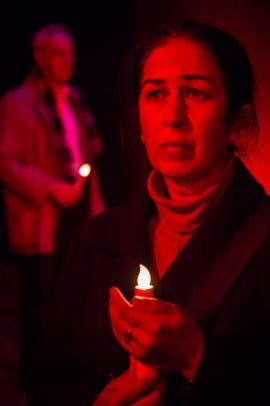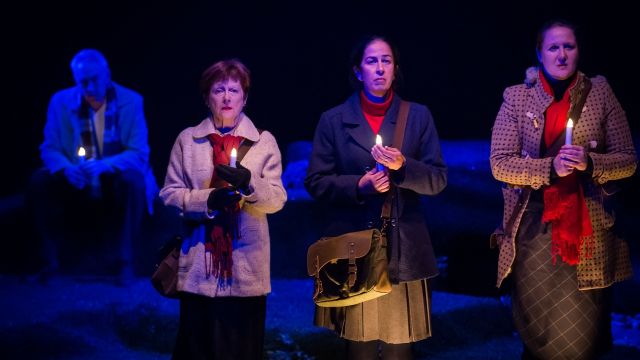The Women of Lockerbie
Is it possible that we may, some day, come to take acts of terrorism as facts of life?
Will they simply become another chapter in a history book?
Will we forget those whose lives were lost, or how horribly they died?
Not if theatre sustains its centuries old objective of finding a way to reflect on and interpret the world on the stage.
In The Women of Lockerbie, playwright Deborah Brevoort confirms that tradition – and Bernard Teuben’s production for Castle Hill Players ensures the beautiful language and carefully drawn characters of her play make the messages of Lockerbie endure.
 The Pavilion Theatre stage becomes a frosty night on the hills of Lockerbie. It is the winter solstice, seven years exactly since Pan Am Flight 103 from Frankfurt to New York was blown up over the town, killing 243 passengers and 16 crew. As the wreckage rained down over Lockerbie, buildings were destroyed and 11 villagers killed.
The Pavilion Theatre stage becomes a frosty night on the hills of Lockerbie. It is the winter solstice, seven years exactly since Pan Am Flight 103 from Frankfurt to New York was blown up over the town, killing 243 passengers and 16 crew. As the wreckage rained down over Lockerbie, buildings were destroyed and 11 villagers killed.
Tonight, as the villagers keep their annual vigil, paying homage to those who were lost and those who were left to mourn, a still-grieving American mother searches the hills of Lockerbie for some sign of her son, whose body was never found.
Using a Greek chorus to link the past and present, Brevoort recreates the initial, grisly horror of the disaster – and the enduring impact of such a wanton act of terror. In this the cold, dark night the evolution of grief, despair – and hate – is gently but powerfully explored. Teuben’s cast feel the weight of their messages and the characters they depict are very real and, at times, heart breaking.
Michelle Masefield leads the chorus as Olive Allison – a local woman who carries her memories closely. Masefield finds all the nuances of Allison’s personality. Her persuasive depiction encompasses compassion, understanding, leadership - and grief - in a lilting accent that emphasises the strength of the character.
Anne Geenen and Rebecca Fletcher support her as, together, they recreate vividly sharp word pictures of the aftermath of the crash and how distinctly those moments remain in their memories.
Kim Schad plays the grief-stricken mother, Madeline Livingstone. As she wanders the wintery hillside calling her son’s name, Schad reveals the unresolved confusion of painful memories and aching sorrow that Madeline has carried for seven years. Her husband, Bill has tried to rationalise her unrelenting grief at the expense of his own, bringing her to Lockerbie in hopes to find some resolution. As Bill, Stephen Snars stalwartly contains the grief that bubbles near the surface of the façade of strength he has had to sustain for so long.
 The characters of George Jones and Hattie bring a little lightness to the play. Jones, played by Larry Murphy, is an American official responsible for destroying the lasting relics of the crash. He is brash and task-oriented and Murphy depicts this with abrasive determination. Countering him, is the equally determined and facetious cleaner, Hattie, played with clever comic timing by Penny Johnson.
The characters of George Jones and Hattie bring a little lightness to the play. Jones, played by Larry Murphy, is an American official responsible for destroying the lasting relics of the crash. He is brash and task-oriented and Murphy depicts this with abrasive determination. Countering him, is the equally determined and facetious cleaner, Hattie, played with clever comic timing by Penny Johnson.
Under Sean Churchward’s dark, atmospheric lighting, this exceptionally committed cast and sensitive director bring Deborah Brevoort’s very different take on verbatim theatre to delicate life. The burden of their extensive research on the disaster is obvious in the delicate development of their characters and their expressive articulation of Brevoort’s elegant writing.
This short but compelling play is not just a reminder or a commemoration. It is also a tribute to playwrights and players who are prepared to produce theatre that does more than just entertain. It is a courageous production performed exceptionally well.
Carol Wimmer
Photographer: Chris Lundie


Subscribe to our E-Newsletter, buy our latest print edition or find a Performing Arts book at Book Nook.

